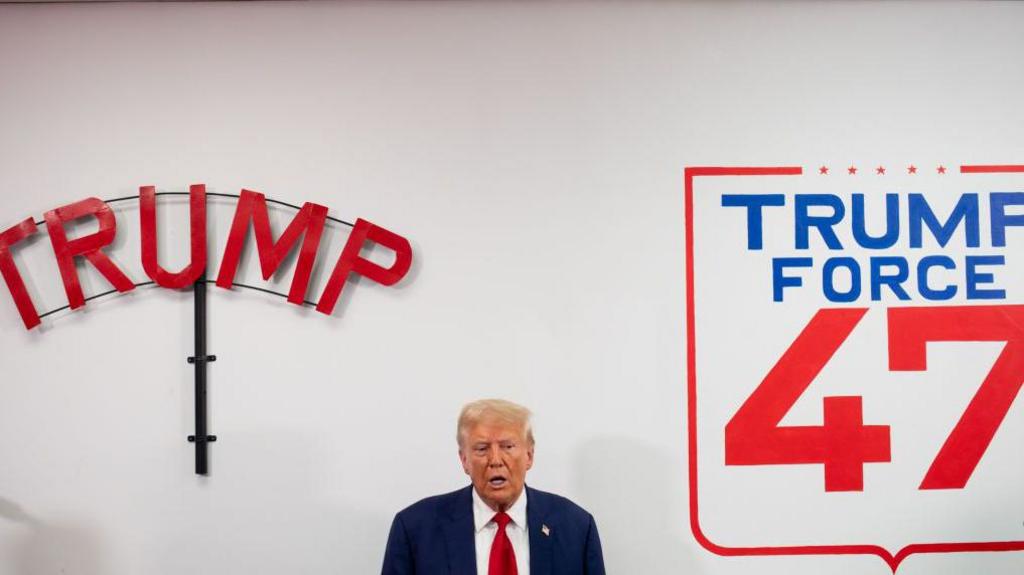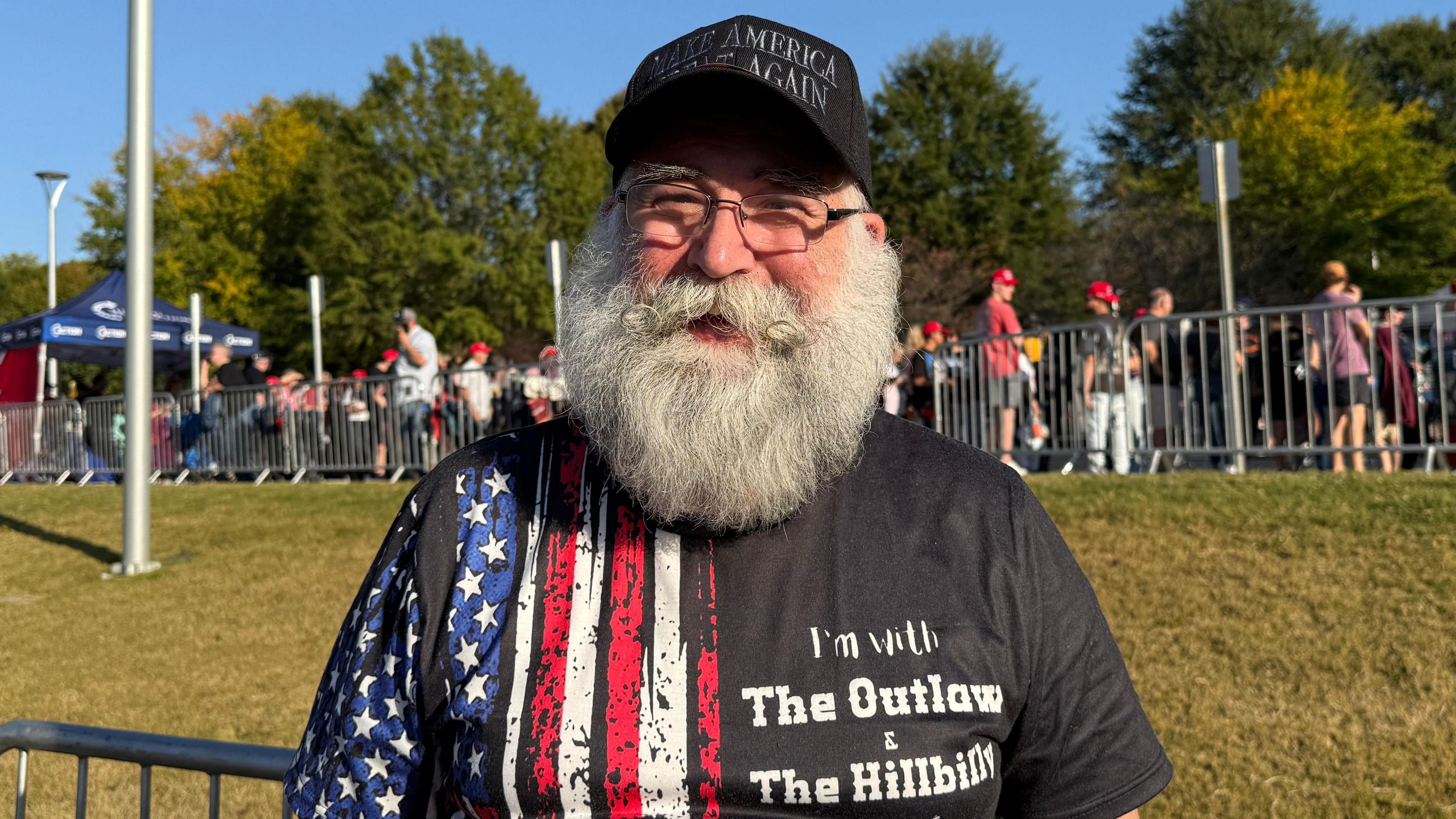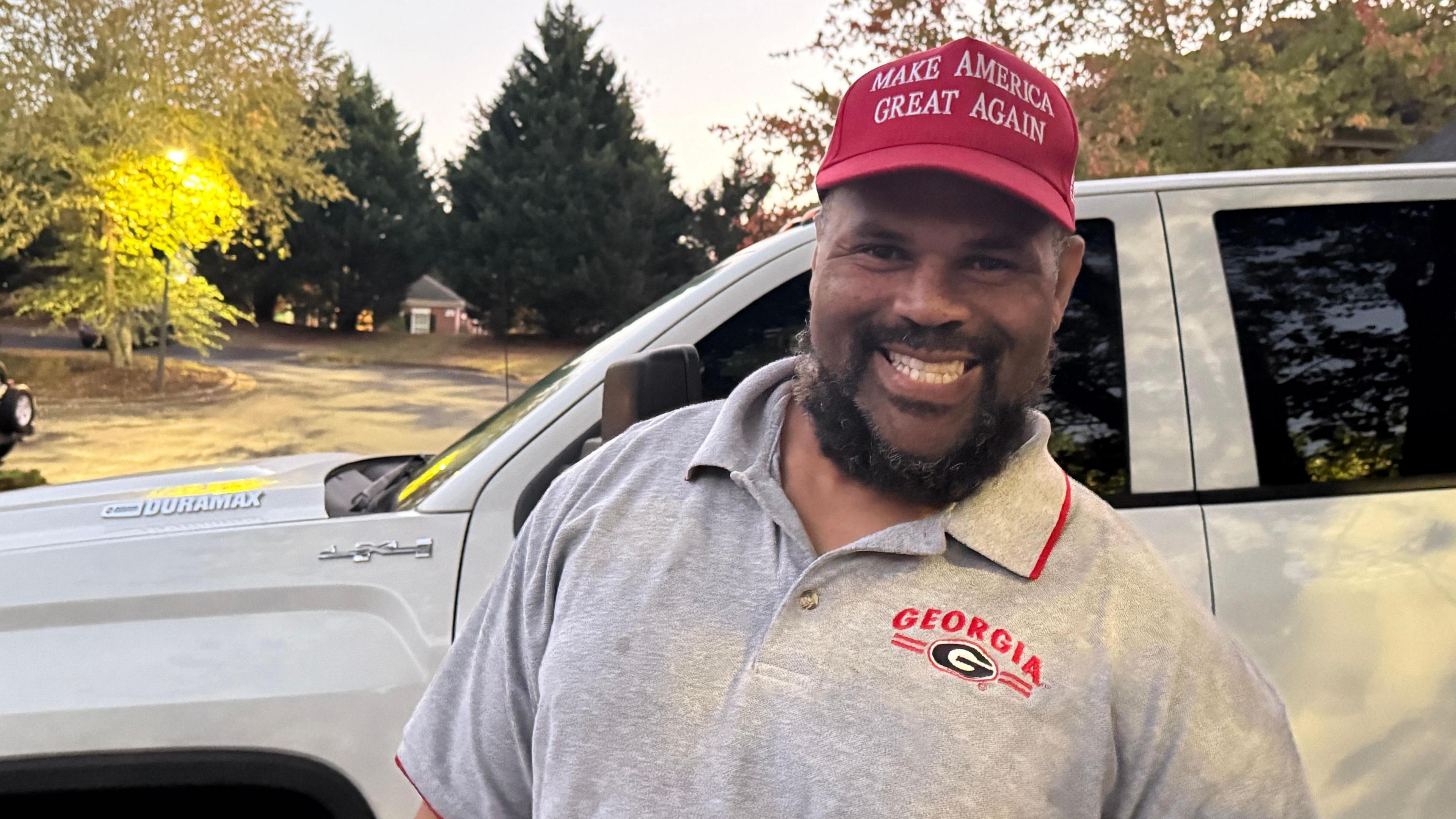Inside Trump's push to recruit an army of volunteers

Trump Force 47 is the campaign's effort to recruit grassroots volunteers in battleground states
- Published
Every weekend, Dean Cottle knocks on his fellow Georgians’ doors to persuade them to vote for Donald Trump in the US election.
“What do you have to lose?” he tells them, echoing a favoured argument from his chosen candidate. “Our economy has suffered under the policies of this administration. The immigration is really causing problems.”
The longtime supporter of the former president is a “captain” in the Trump Force 47 programme, the Republican Party's effort to turn thousands of battleground state supporters into an army of ground troops for Trump.
But some Republicans in Georgia, a key swing state, have questioned the Trump campaign’s additional, heavy reliance on third-party groups. These groups are new to what is broadly called “the ground game” – the highly personal, door-by-door, call-by-call, flyer-by-flyer effort to win every single last potential voter in an election.
The strategy is a notable change from past elections, and even from the Trump campaign’s own playbook early in the primary calendar.
The novel coalition also focused on so-called “low-propensity voters” - those who are less politically engaged – rather than on the loyal Trump base.
It's a decision that some Republicans have considered risky for Trump. Then again, the normal rules of campaigning have never applied to the former president.
“President Trump is a unicorn,” said Jimmy Centers, an Iowa-based Republican strategist. “He has the ability to announce a rally 24 hours out and get tens of thousands of people… He brings people out who are otherwise very difficult to reach. I would caution everyone who’s looking at how he approaches his organization relative to past candidates.”

Dean Cottle knocks on doors for the Trump campaign every weekend, trying to convince less-motivated Republicans to vote
Trump Force out in force
Trump Force 47’s website provides a list of volunteer opportunities like phone banks, virtual training, and canvasses in each of the key battleground states.
Mr Cottle signed up for the programme through a Facebook advert, then took a one-hour training course to become a “captain” at the local campaign office. An app directs him where to go in Fayette County, his home, then he travels “house to house, getting commitments from people”.
Nearly three million have voted early in Georgia as of 28 October. Polls show essentially a dead heat between Trump and Harris in the state.
But it’s not clear if the campaign itself is recruiting a large number of volunteers in Georgia quickly enough, and motivating them to put in the long but necessary hours to win an election with such razor-thin margins.
The Trump campaign did not respond to the BBC’s request for comment about its ground game in Georgia.

Gerald Cambor attended volunteer training for the Trump campaign at the Cobb County Republican office
Judith Hannon, who attended a Trump rally in Duluth, had no trouble finding opportunities to volunteer for Trump in 2016 or 2020 through Georgia’s Republican apparatus. But this year, she said, it was unclear how to get involved.
Gerald Cambor, 49, learned about Trump Force 47 when he attended an event for the former president in Cobb County on 15 October. Mr Cambor never engaged in politics until he became a Trump supporter due to his economic policies. Now, he is fired up to send him back to the White House.
But by the time he completed “captain” training and downloaded the campaign’s app, there were just 11 days to go until election day.
“It would have been better if I found it sooner,” Mr Cambor said.
An unwieldy coalition
Trump’s campaign has delegated a great deal of its ground game to two new, prominent groups: Turning Point Action, a political arm of the conservative youth organisation Turning Point USA, and Elon Musk’s America PAC.
But these groups do not have the years of experience that traditional, more established campaign groups do in turning out votes. And they have a different approach.
The US Department of Justice recently warned Musk that a pledge to give $1m (£770,000) per day to a registered voter in Pennsylvania who signs a petition with his PAC, might be illegal. Musk is also being sued by prosecutors in the Philadelphia. He denies any wrongdoing.
Turning Point Action and America PAC appear to have merged some operations in the battleground state of Wisconsin, Politico reported.
But Republicans in Georgia are sceptical that this unwieldy coalition has formed a strong enough ground game.
“There’s no central mission to their ground game” in Georgia, said one Republican operative who works with politicians in the state and asked for anonymity to speak frankly about Trump’s volunteer operation. “It just seems like they have places for people to go to feel like they’re a part of (something)... But there’s no real, organised, get-out-the-vote effort.”
Georgia’s own Republican governor, Brian Kemp, leads a powerful grassroots effort known as Georgians First, which has spent over $3m to turn out the Republican base for candidates up and down the ballot.
But they’re not working explicitly behalf of Trump, the governor said.
“I wouldn't really be able to speculate on exactly what all they're doing,” Kemp told the BBC.
“President Trump's campaign, they have just a different model.”

SIMPLE GUIDE: Everything you need to know
ECONOMY: Harris and Trump should listen to this mum of seven

North America correspondent Anthony Zurcher makes sense of the race for the White House in his twice weekly US Election Unspun newsletter. Readers in the UK can sign up here. Those outside the UK can sign up here.